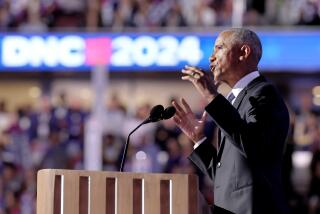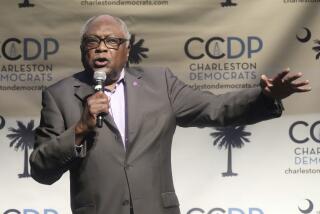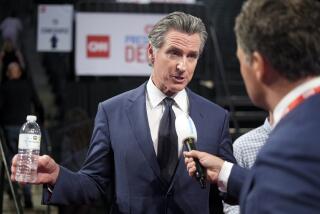Heated Debates End in Truce for Democrats
WASHINGTON — After slugging it out for much of a Sunday debate doubleheader, Democratic presidential contenders declared an informal truce and agreed that however sharp their differences, they still prefer each other to President Bush.
Former Massachusetts Sen. Paul E. Tsongas, who bore the brunt of his colleagues’ attacks in a bitter debate Saturday in Denver and during the confrontations Sunday in Atlanta and College Park, Md., claimed the role of chief peacemaker.
“There may be differences between us,” he said just past the midway point of the 90-minute forum in College Park. “But you’ve got to remember that whatever differences exist are marginal compared with George Bush. And that’s what we’re talking about.”
Arkansas Gov. Bill Clinton, who earlier in the day seemed prepared to rhetorically dismember his adversary from Massachusetts, promptly seconded the motion.
“Having these arguments is not destructive as long as we remember what Sen. Tsongas said,” Clinton asserted. “I will tell you something. I don’t mind arguing with these folks, and I’ll do it until tomorrow at dawn if you want. But when the cows come home, I’m going to be trying to replace George Bush, whether I finish first or last in the primary.”
But before the onset of harmony, plenty of harsh words were heard, most of them directed at Tsongas, who leads in polls in Maryland and Colorado, and at Clinton, who is the front-runner in surveys in Georgia. The three states represent the major prizes in a crucial round of primaries and caucuses on Tuesday.
Taxes was the issue that set off most of the sparks in the Atlanta debate, which also involved California Gov. Edmund G. (Jerry) Brown Jr. and Nebraska Sen. Bob Kerrey--who participated via a satellite hookup from Denver, where he was campaigning. Iowa Sen. Tom Harkin was absent.
Clinton landed the first punch, responding to a question about Tsongas’ charge that the Arkansas governor’s support for a middle-class tax cut amounts to pandering. Not so, Clinton maintained, arguing that the cut would have a short-term, stimulative effect on the economy. He contended that it was “dead wrong” to oppose a tax cut for the middle class while endorsing a cut in the capital gains tax.
“The question is not whether the middle class gets a tax cut,” Clinton said. “It’s do you want to give it to the middle class or to people investing in stocks?”
While he was at it, Clinton also took a shot at Tsongas’ plan to raise the federal gasoline tax by 5 cents each year over the next decade. “How is that fair to rural people in Arkansas and Georgia . . . when people riding the ‘T’ (subway) in Boston and the other people riding mass transit won’t have to do that?” he demanded.
But Tsongas had a snappy reply. “You in fact did raise the gasoline tax 5 cents (as governor of Arkansas), so I am just trying to honor your tradition,” he said sarcastically.
Tsongas called his proposal to boost gasoline revenues essential for funding an energy policy that is “constructive and coherent and gradual.”
Clinton also had to defend himself against Kerrey in the Atlanta debate. The Nebraska senator--who last week said Clinton was not electable because of the controversy surrounding his draft status during the Vietnam War--returned to the attack on that sensitive point.
Looking Clinton right in the eye, Kerrey denied that he had questioned the Arkansas governor’s patriotism. Then he said: “Central to your message is this notion of national service”--a proposal to encourage young Americans to serve their country at home or abroad.
“Now, you did have a chance to serve in the 1960s. You could have gone to the Peace Corps or walked into any recruiting office and joined up and served when duty called,” he said. “What do you say to a young person when they come back and ask you: ‘How come you didn’t serve in the 1960s?’ ”
“I’d tell them first of all that I opposed that war,” Clinton replied. “I thought it was a terrible mistake.” Clinton added that he had given up a four-year draft deferment and that during the year when he was eligible for the draft lottery, “I thought I was going to service; I expected to be drafted.”
Clinton had obtained a deferment in 1969 on the condition that he would join ROTC at the University of Arkansas. A few months later, he gave up the deferment, saying that he felt guilty over having obtained it and that he opposed the war. He got a high number in the draft lottery, however, and was never called.
At the Atlanta debate, panelist Bill Nigut, a reporter at WSB-TV, asked Clinton: “Did Sen. Kerrey challenge your patriotism or not? He was certainly tough last week.”
“It just depended on what day you listened to him,” Clinton replied. “But, you know, these things happen in campaigns, and I don’t take them personally.”
When the battleground shifted to Maryland--where Kerrey was absent--Brown took aim at the economic policies that have been the basis for Tsongas’ surprisingly strong early showing in the campaign. After Tsongas urged government incentives to business to revive the cities, Brown called the notion “one of the weaknesses” in Tsongas’ thinking.
“He talks about capital gains breaks and things that might have some effect on already started-up businesses,” Brown said. “But the problem in this country is there are millions and millions of poor people who’ve fallen completely below the safety net and they need immediate help.”
Brown also took a dim view of Tsongas’ “Call to Economic Arms,” the former senator’s blueprint of economic ideas, which helped him win the New Hampshire primary last month.
“Having read this call to arms, my objection is that I don’t see anything in there that is going to help the large industries that have to compete with Japan,” he said. “You can spawn a lot of new industries, and we’ve done that in California in a way that leads the world. The problem is when they get to be a billion-dollar industry, they get run over by the bigger Japanese industry.”
The fiercest blows of the day were struck by Harkin, the self-described “only real Democrat” in the race. During the course of the Maryland debate, he took after both Tsongas and Clinton--and Brown for good measure.
“Unless and until we get rid of supply-side, trickle-down economics, none of the things that either Mr. Brown or Mr. Tsongas says is going to work,” Harkin said of the proposals made by the two front-runners for reviving the nation’s cities. “Look what it’s done to us. And yet, Mr. Tsongas preaches more of the same philosophy.
“What I say we have to do is to get jobs for people,” Harkin argued. “The best social program is a good job. And that’s true in our cities.”
Later, after Clinton sought to minimize the threat environmental protection posed to economic growth, Harkin snapped: “Mr. Clinton, that was a very nice, flowery little speech, but we have to start reading the record and not reading our lips, my friends. The fact is that Arkansas has been rated last in environmental policy.”
* CALIFORNIA GOP DISCORD: A bitter state convention ended with a face-saving straw-vote victory for President Bush. A3
More to Read
Get the L.A. Times Politics newsletter
Deeply reported insights into legislation, politics and policy from Sacramento, Washington and beyond. In your inbox three times per week.
You may occasionally receive promotional content from the Los Angeles Times.










